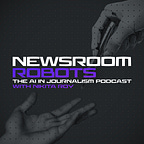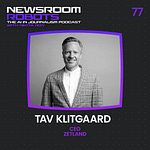
We in journalism often find solace in the phrase “human-in-the-loop,” believing it is our ultimate safeguard against the unpredictable tides of artificial intelligence. But what if that comfort has become our greatest strategic vulnerability? What if our unwavering insistence on human oversight is actually preventing us from unlocking AI’s truly transformative potential?
I had the privilege of moderating a provocative live panel at the Nordic AI in Media Summit. My guests were three newsroom leaders who are at the forefront of integrating AI in journalism: Gard Steiro, Editor-in-Chief and CEO of Verdens Gang(VG) in Norway; Fabian Heckenberger, Managing Editor and Senior Editor for AI at Süddeutsche Zeitung (SZ) in Germany; and Naja Nielsen, Media Director at Sveriges Television (SVT) in Sweden and former Digital Director at BBC News. We discussed the big questions facing media organizations today: How do we align AI with our core editorial values? What does it take to earn trust in AI-powered news products? And how should we structure our teams and strategies to stay agile amid relentless, dizzying change?
Here are three takeaways from our conversation:
1️⃣ Embrace Uncertainty and Foster Internal Debate for Agility
In a landscape where regulations are fluid, and the future remains hazy, focusing on what you can control internally is paramount. Gard Steiro of VG shared his perspective: “My most important task as a leader is not to point the direction, but to foster a discussion within the organization … People disagree and we have that discussion at VG and we work with scenarios.” The goal isn’t to possess all the answers but to cultivate an environment where uncertainty is openly acknowledged—enabling constant experimentation and the emergence of diverse solutions. Naja Nielsen reinforced the point, arguing that top managers must be “brave enough to make the damned-if-you-do, damned-if-you-don’t decisions” and adopt Silicon Valley’s iterative, test-and-learn mindset. Our biggest legacy constraint, she says is the lingering belief that “the editor-in-chief must be the most clever man in the room and therefore he or she must make all decisions of importance.”
2️⃣ Redefine “Human-in-the-Loop” and Prioritize Real User Needs
The traditional notion of a "human in the loop" for every AI output might actually be holding us back. While transparency and admitting errors are crucial for trust, as Gard pointed out, "If you still insist on that [human in the loop], we won't take the advantages of AI." Naja questioned our inherent trust in humans over machines: “If I had to choose between a doctor doing the surgery and a machine right now doing it on my beating heart, I would prefer the machine.” She challenges us to think about what humans truly excel at – "storytelling, the on the ground reporting, everything that only humans can do" – and let machines handle tasks they can do better, even if it means rethinking our established workflows. Fabian Heckenberger of Süddeutsche Zeitung (SZ) echoes this, urging newsrooms to move beyond “playing with AI for the sake of AI” and concentrate on how it boosts subscriber retention and efficiency.
3️⃣ The Article May Die, But Storytelling and Unique Value Will Thrive
In the discussion about whether the article—treated as a commodity—has run its course, Gard responded, “The article will die, should die, but storytelling will not” Naja added a different perspective, suggesting that articles will survive for a niche audience, yet the panel’s shared message was unmistakable: format is secondary to relevance. The real challenge is to pinpoint journalism that as Gard said “can’t be copied, that gives value to the readers,” and rapidly redirect resources there. Fabian also highlighted that in a flood of easily produced, unverified content, there is a rare opportunity for “truly high-quality journalism to double down on what we’ve been doing for the last five to ten years.” The future of news is not about preserving outdated formats but about inventing new, compelling ways to deliver essential and trustworthy information.
This conversation was recorded live at the Nordic AI in Media Summit in Copenhagen. 🎧 Listen to the full episode on Apple Podcasts, Spotify or other major podcast platforms.









